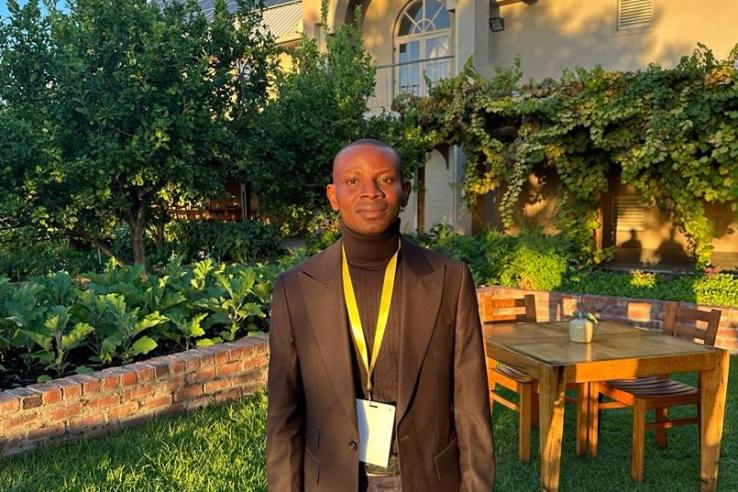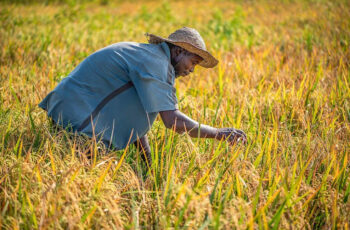African Scholar Spotlight: Toyin Samuel Olowogbon

Photo credit: Toyin Samuel Olowogbon
This post is part of our ongoing series showcasing the work and perspectives of economists from the African continent who are leading randomized evaluations. Through our African Scholars Program, we hope to help create more opportunities for African researchers to advance the research agenda on the continent through randomized evaluations. This blog features Toyin Samuel Olowogbon, an agricultural economist at the Centre for Sustainable Agricultural Empowerment and a postdoctoral research fellow at the Institute for Food Security and Commercial Agriculture, Federal University Oye-Ekiti in Nigeria. Toyin’s primary research interests focus on development and agricultural economics.
What drew you into the field of development economics and, in particular, working with impact evaluations?
I started my career in agricultural research because I wanted to address real problems in my community. I also recognized the importance of using robust evidence in this work. In 2014, while pursuing my doctoral program, I discovered the power of randomized evaluations to provide credible evidence. This discovery motivated me to learn more about impact evaluations.
I began using randomized evaluations to study the effects of different programs in agriculture. With each project, I further developed my skills and witnessed the potential of evidence-based policymaking.
Today, I am passionate about using research to identify innovative solutions for agricultural development in Nigeria. What began as a youthful aspiration to help my community has evolved into a commitment to leveraging development economics to catalyze progress and prosperity in agricultural communities across Nigeria.
What are your broad research interests?
My research interests lie in development and agricultural economics. I am passionate about fostering sustainable development through innovative projects focusing on agriculture, climate change, financial inclusion, labor economics, and various other development sectors.
What are you using initiative funds to do? What research question are you trying to answer, and how does it relate to your context?
My team has received funding from various J-PAL initiatives, including a proposal development grant from J-PAL and CEGA’s Digital Agricultural Innovations and Services Initiative (DAISI) which has recently been completed. Our project, titled “Digital Climate Change Adaptation Services for Sustainable Agricultural Productivity in Nigeria,” was an exploratory study of a bundled digital climate service project in Nigeria known as SOFADRICLIMATE. This platform empowers Nigerian farmers with personalized climate information and affordable weather index micro-insurance, enabling them to make informed decisions to protect their crops and livelihoods. The funds were used to build partnerships, explore farmer characteristics influencing the uptake of digital packages, identify barriers to adoption, and assess the preliminary impact of the app’s utilization among farmers.
My team is also currently funded by DAISI for a pilot study (which builds on a DigiFI-funded proposal development grant) titled “The Agribroom App: Targeted Bundled Digital Agricultural Technology for Inclusive Agricultural Productivity.” This study aims to answer questions such as whether a new digital platform can impact farming households’ access to farm inputs and advisory services and how it interacts with women’s welfare and decision-making, as well as overall household welfare. We will assess the take-up of the digital platform, input purchases, and prices, as well as measure the monetary value of maize output. The pilot will prepare the project for a future randomized evaluation to generate new evidence on the impact of bundling access to farm inputs with relevant advisory services.
What do you see as the big unanswered research questions in your context that RCTs may be able to help answer? Does this relate to any projects you are excited to work on in the future?
There are several exciting areas where randomized evaluations can be used to answer important questions in the context of Nigerian agriculture. One area I find particularly interesting is the impact of empowering smallholder farmers through technological interventions. This could involve using technological interventions to improve access to insurance, farming inputs, and studying the effectiveness of targeted digital literacy interventions. Another unanswered question is how to address the mismatch between the skills of graduates from agricultural higher education programs and the needs of the agricultural labor market. These types of research questions highlight the potential of RCTs to identify solutions that can transform agricultural practices and improve outcomes for farmers and their communities in Nigeria.
How has the support you have received from J-PAL to date assisted you in your career? How can organizations like J-PAL continue to build on the support they provide to local researchers in running randomized evaluations?
The assistance I’ve received from J-PAL thus far has been instrumental in preparing me for a career in development economics. In particular, the mentorship provided through the African Scholars program has been invaluable as it has allowed me to engage with experts in the field and has significantly enhanced my research skills and capacity.
Beyond financial support and mentorship, organizations like J-PAL could further aid local researchers by facilitating the return of African Scholars to their respective institutions to mentor or train their colleagues. This approach not only fosters knowledge dissemination but also strengthens the research capabilities of local scholars.
Do you have advice to offer other young aspiring African scholars thinking about a career in economic research?
There are many opportunities for young African scholars in economic research. Local researchers play a crucial role in tackling challenges specific to our continent. This recognition can boost confidence and highlight the potential impact African scholars can have.
Don’t let rejections discourage you. See them as learning experiences that can help you improve. Mentorship and collaboration with peers are key to accelerating your growth in this field. For aspiring African scholars considering economic research, my advice is to be persistent, believe in yourself, and work together with others to achieve success.
What advice would you give to scholars who are considering applying to J-PAL for funding?
- Adopt a mindset of continuous learning.
- Study projects implemented by past grantees to gain insights into successful strategies.
- Thoroughly understand the criteria for the specific initiative you intend to apply for.
- Develop a research idea that addresses a problem aligned with the respective J-PAL initiative’s focal areas. Additionally, conduct comprehensive background research to validate your concept.
- If you’re at the pilot stage, make sure to secure an implementing partner to enhance the feasibility and impact of your proposal.
- Craft a well-written proposal and persevere in your pursuit. Rejections may come, but persistence is key.
What are some of the key mistakes you made in your early applications?
In my early applications, I made several mistakes. I neglected to thoroughly study the criteria for each of J-PAL’s initiatives, leading me to apply to initiatives for which I was ineligible to apply. Furthermore, some of my ideas were not well-suited for the specific J-PAL initiative to which I submitted. Despite being redirected to the appropriate initiative, these misalignments were among my initial errors.
What surprised you the most about how the funding process works?
The funding process at J-PAL is structured. It begins with the submission of a Letter of Interest (LOI), followed by a brief call to receive feedback on their LOIs. This feedback loop significantly enhances the quality of the full proposal to be submitted. What surprised me the most about the funding process was the level of support and guidance provided to applicants, which transformed what could be a daunting competition into a collaborative and enriching experience.
